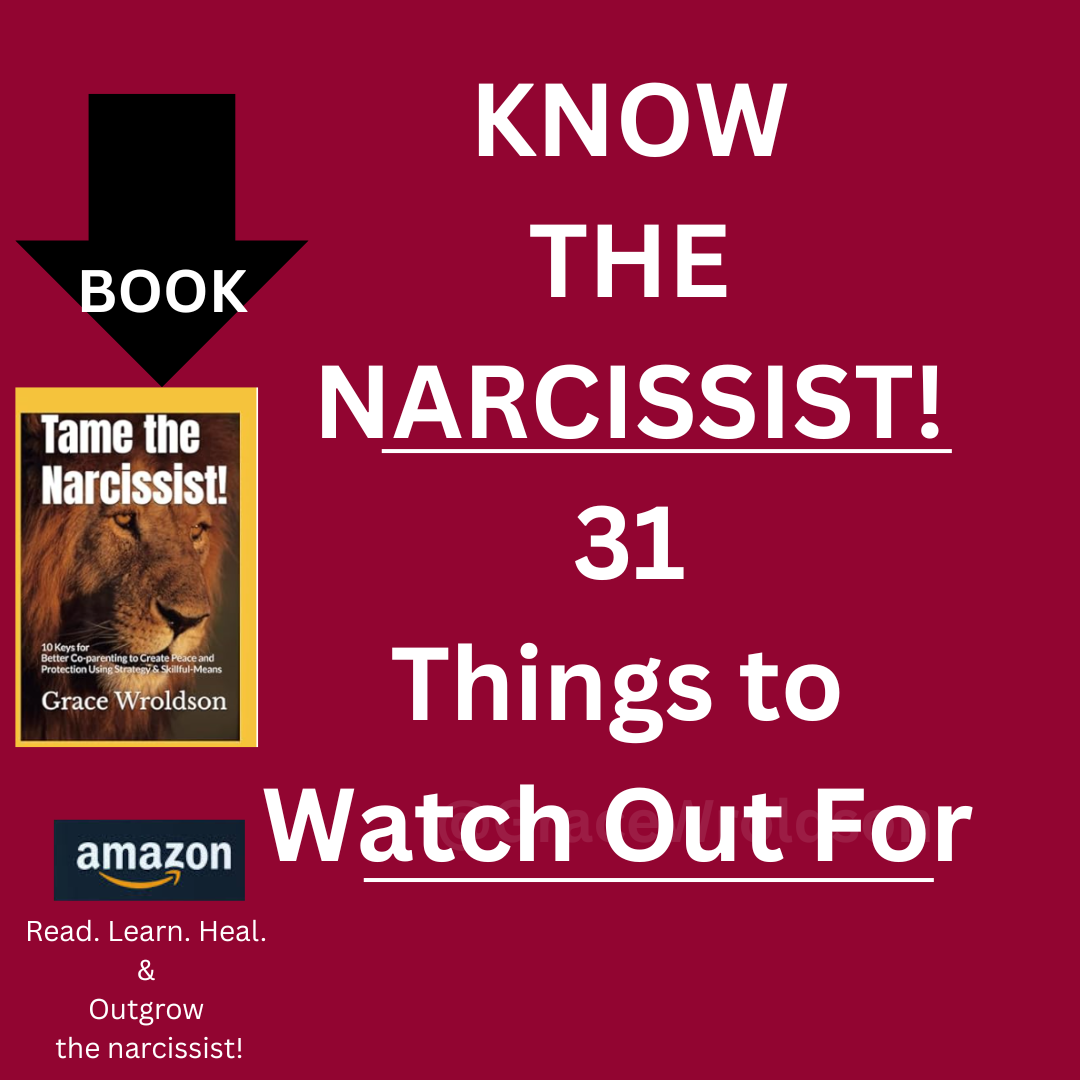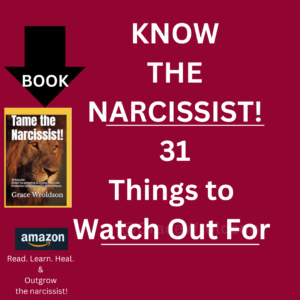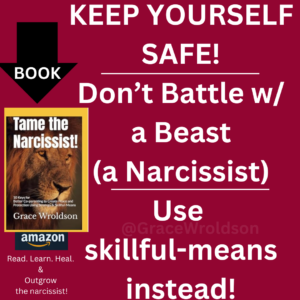It’s Important to Know the Narcissist!
31 Things About Your Narcissistic Co-Parent
by author Grace W. Wroldson
Do you know what a narcissist is like on the inside?
It’s important to know the narcissist for hundreds of reasons. We need to know what/who we are dealing with if we are co-parenting with a narcissist or if we are involved in legal/custody issues with a narcissist. In my line of service work, I help the mom struggling with a narcissistic father/co-parent, but you are welcome to translate this if you are a grandparent or a father. *Disclaimer below
Ever wonder why a narcissist can break the law and rules so easily?
Gaining an Understanding of Narcissists
Narcissists lack respect. To avoid going crazy from the narcissist’s refined crazy-making tactics, we need to be clear about who/what they are. First, we have to acknowledge the truth of the person we are dealing with. For example, we can’t get respect from someone who doesn’t have respect to give. Generally, they don’t respect rules and laws as a neurotypical person would. A person, not with narcissistic personality disorder (NPD), has a thinking capacity that reasons out long-term consequences and has consideration for others. Narcissists are lacking, as you may well know. You may notice (and become angered and annoyed by this) that they aren’t following court orders or parenting agreements. A piece of paper isn’t going to fix something they lack (in their brain/thinking capacity). I recently watched a news article that showed how modern science has discovered, via brain scans, that certain regions of the brains of those with NPD (in the areas of empathy and reasoning) don’t “light up.” So, in my view, we are dealing with a fundamental flaw. This is why I find it best not to take anything the narcissist does or doesn’t do personally.
What I tell moms is to remember this basic truth:
A personality-disordered person is disordered.
(This means there will be lots of disorder when dealing with them.)
A narcissist will be like, “How dare you ruin my reputation by telling people about things I actually did!?”
One of the worst things I have seen in over a decade of helping moms in peer-to-peer support calls is when the protective, loving, caring mom becomes so toxic (herself) from fighting against a personality-disordered dad. When a mom focuses on trying to get fairness from an unfair person or expose the narcissist’s lies or manipulative behavior, a good mom can go bad like sour milk. If her focus is on the constantly upsetting narcissist, the ground is ripe for resentments, bitterness, and jadedness to filter into her parenting and permeate her precious life. Being in flight-and-fight “stress mode” takes its toll on moms. Chronic high levels of stress are very harmful to our health.
A New Enlightened Approach to Dealing with Narcissists
A key mindset to adopt is a “moving on mindset.” This is where we think like a survivor and an “overcomer” who has moved on past the parasitic relationship and are no longer losing energy to an energy-vampire. The evolved approach is where we say, “Let’s just make the kid’s life good.” A change of focus to survival and meeting the child’s basic needs while children grow into adulthood and learn to meet their own needs can be life-saving. A mindset of; “Let’s stay sane and practice kindness,” can also be a game-changer in the chess game with a narcissist. Sometimes, the best thing to do to survive is not to play another’s sick, draining game. Do: Using wisdom, take an enlightened and evolved approach when dealing with a narcissist.
We moms don’t want our children’s childhoods to be corrupted or ruined by a war. If we take the position of “mom against dad,” it can be very psychologically harmful for the child caught in the middle. (NOTE: Each case is different. Take what is helpful here.) It’s not below a narcissist to use a child as a pawn, hostage, punching bag, or weapon. Being involved in an ongoing duel with a narcissist affects us profoundly because we live in constant fear and stress of what the narcissist might do next. This all affects us negatively and our child’s emotional and mental health. It is very difficult to be emotionally supportive to a child with a narcissistic father if we are allowing ourselves to be emotionally unraveled. After a 12-year family court battle that financially devastated me, I teach moms to avoid this battle as much as possible by getting support and being super strategic.
Why To Stop Being a Narcissist’s “Target of Blame”
While I can’t give direct advice because I am not a lawyer or therapist, I do advise obtaining a basic knowledge of narcissists from the experts who are in the top of this field. I dedicated two solid years researching and reading about narcissists, after I lost a round in family court. I was willing to do anything to protect my young daughter—even learn about personality disorders that I wanted nothing to do with. As a survivor, I share my survivor-wisdom and I teach moms how to steer clear, stay off the radar, and remain neutral with a narcissist so that we don’t inadvertently become the TOB (target of blame). The narcissist has some really terrible survival/defense programs that can be unleashed on victims in the form of post-separation abuse, co-parenting abuse, legal abuse, retaliation, revenge, and more. Generally, they are haters. And we know that haters hate. So, remember to self-protect, practice self-preservation, and focus on what matters (you, your health, the children)—not the narcissist.
Many of the narcissist’s ways are passive-aggressive and covert. Some are not obvious to outsiders, like coercive control and masked threats. Many of us, loving, caring, generous souls, will not understand a selfish, greedy, self-centered narcissist. You are not alone with the shock of how awful a narcissist can be. It may take a while to get your mind around the narcissist’s disorder. Once I understood this creature, I did things very differently. This resulted in being able to negotiate with a narcissist and win back all my rights and parenting time.
Read my 2 individual instant digital guides online:
- How-To Communicate With A Narcissist Using Skillful Means
- 25 Key Phrases That Can Neutralize The Narcissist: When Co-Parenting or in a High-Conflict Custody Battle
You may have already experienced the narcissist being overly entitled and avoiding responsibility in all forms for the children. It’s part of their terrible nature. After healing and when your children are grown, you may be able to laugh at the absurdity, but for now, you must cope with unfairness. If you are looking at years having to raise a child or children, it’s important to get an education and raise your awareness about what narcissists are typically like (in general).
Over the years, I developed survivor-wisdom, which made life more bearable. I discovered some key things that work better than fighting with a narcissist, and they involve skillful means and other strategies. If you go up against a narcissist or poke the beast, you may discover how petty they can be!
If you inadvertently or purposely bruise their ego, you may see them become very retaliatory. They often seek to control out of their own fears. They tend to be extremely paranoid and overly suspicious (because they think others think like them)! As you may well know, they avoid responsibility unless stepping up makes them look good. Image management can
Bottom line: It’s important to know the narcissist. (To understand what you are dealing with and where not to step, and what bridges to build and gates to install.)
Being prepared and briefed with this knowledge can:
-Help you not be so shocked by cold and/or cruel behavior.
-Help you adjust your thinking and eliminate expectations.
-Help you strategize and use skillful means.
KEY: When we make a decision about our co-parenting/custody case or our child, we must consider the narcissist and all the things we know about him.
(I know that we concerned moms often consider our children first and foremost, but if we are required to co-parent, we also have to consider the highly triggered, easily-angered narcissist, too.)
See if you recognize these characteristics in the narcissist you are dealing with.
NOTE: These are general and typical. Traits may vary with each personality-disordered narcissist.
Here are 31 things you need to know about the narcissist that you are required to “co-parent” with.
He feels overly entitled and is very unfair. (He will take more than his share and avoid payments.)
He lacks empathy and is selfish. (Don’t keep appealing for pity or sympathy.)
He needs narcissistic supply to survive. (usually other people’s energy)
He is easily triggered.
He is pathologically jealous.
He is full of lies and can easily twist the truth into a lie. (He can make believable half-truths.)
He has many emotionally destabilizing tactics for victims.
He can sabotage himself —if allowed to, and there are no high-level enablers.
He loves causing chaos, confusion, drama, and pain.
He will often retaliate, seek revenge, and hold a grudge—even if it hurts himself or his own child.
He is an opportunist when looking for narcissistic supply. (He will look for those who are weak or perceived as non-protected.)
He is toxic to others. (Mental, emotional, and psychological abuse generally follows.
He is a chronic complainer and expert blamer. (He can blame-shift and deflect like a pro.)
He seeks to be in charge and craves control.
He is greedy. (Generous acts are usually for display, first impressions, and image management.)
He loves to get away with things.
He is highly competitive. Narcissists love to win and hate to lose. (Narcissists will compete with their co-parent rather than cooperate.)
He likes to look good and hates looking bad. (He will use others for this, too.)
His ego is easily bruised, and he will take swift offense. (Everything is about him.)
He gets energy from arguing and draining others. (He often enjoys verbal rows.)
He is typically very harmful to children. (narcissistic abuse, verbal abuse, mental abuse, emotional abuse, sometimes physical abuse) Often, very neglectful of children.
He will avoid responsibility and enjoy crafting clever excuses and using deflection
He will enjoy taking credit, and he will avoid all blame. (He will use the blame game for enjoyment to stir things up and offend others to watch them get emotional and off balance.)
He doesn’t have a moral compass or conscience that directs him. (that’s why they can cheat)
He is a bully, a control freak, (very absent-minded, neglectful of others, and often an abuser)
He regularly seeks intel, info, and data on perceived enemies to use later as weapons.
He doesn’t have good priorities that are for the good of all involved.
He is passive-aggressive and covert in sabotaging targets of blame
He HATES being told what to do!
He thinks rules and laws don’t apply to them.
He seeks entertainment, fun, and pleasure at the expense of others.
Don’t be fooled by the narcissist. A narcissist will try to convince you that you are being difficult, but the moment they are out of your life and influence life is incredibly peaceful. If you find yourself pushing against the reality of any of these 31 (saying these type shouldn’t be this way), you may be adding to the struggle. Self-check in: How easily can you accept these statements above—even if you don’t agree or like them? If you have recognized these awful defects of character in the person you are dealing with, it may be time to firmly adjust your thinking. Before I could clearly see the narcissist, I was guilty of projecting my good nature and heartedness onto the narcissist and was surprised that he couldn’t care less about our child’s well-being. This left me appalled by the narcissist’s deficiencies and coldness towards our child. From that emotional state of being stunned, I was affected by my own confusion. My goal in highlighting these traits above is so that you gain clarity and get very clear.
The best thing I could do, to become strategic and stop being so stressed, was to recognize what his behavior was and identify who he is—so that I didn’t expect him to be normal, care, or think/feel like me. With acceptance of the narcissist being a narcissist, I was able to substitute what was lacking in our child’s life for a father figure and add a healthy male role model. I stopped trying to get something from a narcissist that he didn’t have to give, and thought in terms of supplementing. I also had to be realistic. I had to accept that no one gets out of childhood unscathed by trauma, as much as I wanted to totally protect my young vulnerable child from her own father. Life and childhood aren’t perfect for anyone. Once I accepted my ex was a tried and true narcissist, as a mom, I vowed that I would do my best to shelter some, establish buffers, set boundaries, and install fire-walls against narcissistic abuse or at least limit it. I would do the best I could given the circumstances. I certainly learned not to send my child to the narcissist, hoping for the best. I couldn’t hope that he would be the father I believed he ought to be. Hope was not a strategy in this situation. I accepted that the narcissist was a narcissistic father, and that meant the list above was what our reality was and would be with him. I learned that validating my own reality and my child’s reality was a key to holding onto our sanity.
What’s important is that we give our children “roots and wings.” They need to be able to survive narcissists in the world, as narcissists are everywhere! When we are able to label the nonsense and upsetting character defects, we can adjust our thinking and planning. We can change our choices. We can plan that the narcissist will act like the narcissist he is. Then, we lead our children by example and not lecture. We don’t go to the laundry mat for groceries. We don’t climb to the top of the mountain looking for a river. We don’t answer a spam call expecting our best friend. Knowing all that we identified about the narcissist, we adjust, adapt, and survive. Remember: We can’t make sense out of nonsense.
Q: Are you keeping yourself safe from the narcissist and his tactics?
SurThriver Tip: Don’t do battle with a beast. (Use skillful means instead.)
Ever wonder what motivates or drives a narcissist? (Find my video)
– In Your Corner, Grace W. Wroldson (mom, survivor, author, coach)
Are you “co-parenting” with a narcissist?
In a custody battle with a narcissistic ex?
My goal is to encourage, educate, and help moms empower themselves. I aim to raise awareness for moms dealing with narcissists. Learn all you can because knowledge is power!
May you …Read. Learn. Heal. & Outgrow the narcissist!
NOTE: I suggest reading my 6 books for moms (dealing with a narcissist) in the order written below. You can see how I hung on and went from losing in family court to negotiating with a narcissist and getting it all back.
*Please consider supporting me as a self-published author.
Helpful Books Below:
Book 1: Co-Parenting with a Narcissist: 7 Self-Rules to Stay Sane
Book 2: How To Fight a Narcissist In Family Court and Win
Book 3: Co-parenting with a Sociopath: Survival and Sanity Guide
Book 4: How To Survive a Custody Battle with a Narcissist: When the Family Courts Force You to Co-Parent
Book 5: (NEW) Tame the Narcissist!: 10 Keys for Better Co-parenting to Create Peace and Protection Using Strategy & Skillful-Means
Book 6: (NEWEST) Wisdom for Ending the Co-Parenting War & a Custody Battle with a Narcissist: So You Can Heal and Be Able to Help Your Child
Amazon Link: https://www.amazon.com/dp/B0FML1VQGB
*DISCLAIMER:
Disclaimer: I’m not a therapist or licensed professional. I’m not an attorney. This is not legal or therapeutic advice. I am like you, a mom-survivor. I share opinions, personal research, and hope for a better future. My articles, books, and free videos, which I make, are for awareness/educational purposes only—not intended to be a substitute for medical, clinical, legal, or professional advice, diagnosis, or treatment. Please seek the advice of a licensed mental health professional, attorney, or other qualified provider for your custody case. Each custody case and family situation is different and needs a tailored approach (with strategies) that are specific to the issues you face and even the phase you are in when dealing with a narcissistic ex. I encourage you to establish a system of strong support. Getting help is a sign of strength—not weakness.




